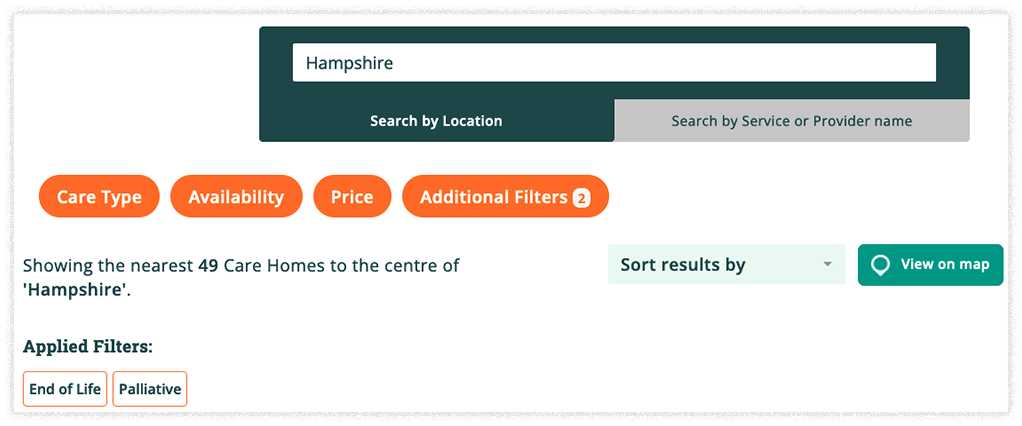Posted by Hannah Rowe
The role of care homes in end-of-life care
When someone is nearing the end of their life, the choice of where they will spend their final days is a significant one both for them and for their family and friends.
Almost half of all deaths in the UK take place in hospital, and many of these people might have preferred to die in their own home. Some may opt to go into a hospice, although this depends on the availability of a bed and the patient’s condition.
Many people are unaware that going into a care home or nursing home as they reach the end of their lives could be an option, even if they have never been a resident in one before.
There are many benefits to choosing this type of facility for the last few days, weeks or months of life. The first thing to note is that care and nursing homes are very experienced at providing this type of care. Most care home residents are over 85 years old (although registered from age 65+) with an average life expectancy of less than two and a half years, therefore caring for people approaching the end of their lives is something which they are used to (and highly capable) of doing.
Care and nursing homes are often described by their owners and managers as places ‘where people come to live, not to die’. Wherever possible the patient will be included in whatever is going on at the home – whether this is a musical afternoon, entertainment, or an outdoor activity. This means that receiving palliative support in a care or nursing home can be a far more pleasant and ‘homely’ experience, both for the patient and their family, at what is a distressing time. Although the patient is terminally ill, care and nursing homes will still aim to improve quality of life, whilst also supporting family and friends.
Care and nursing homes can bridge the gap between a hospital, which has more clinically trained staff but is an unfamiliar environment; and being at home, where there are familiar surroundings but little or no professional support. At the end of life family members may want to do everything for their loved one themselves, rather than being reduced to the role of hospital or hospice visitors. But it is easy to underestimate the emotional toll this can take, and the worry that they may do something ‘wrong’, especially if the patient lives longer than their initial prognosis suggested.
Talking about death
If the person is already living in a care home, an advance care plan may already have been discussed either on admission or when their condition changes. This can be a significant relief, as there is evidence to suggest that residents and their families may not wish to discuss end of life care when they are coming to terms with the prognosis. Advance care planning can reduce inappropriate escalations of care, such as a move to a hospital, and means that in many cases the patient can be made comfortable in their current location without the additional distress of a move. Even if advanced care has not previously been discussed, care home staff often build very close relationships with their residents and are likely to understand the resident’s wishes. This can be a comfort to relatives who may not feel able to make these decisions alone, particularly if the deterioration in the resident’s condition has been rapid and/or has left them incapacitated. The ethos underpinning good care in care homes matches the principles of good end of life care in any setting, and involves understanding the residents’ life story, needs and wishes.
Working together
As with any situation which involves multidisciplinary teams from several organisations, providing palliative care in a care or nursing home can be challenging. The multidisciplinary team members can include GPs, district nurses, and hospice staff, all of whom will have differing schedules and pressures. The practice of holding meetings via platforms such as Zoom has made this easier since the pandemic, and different professionals can add their assessments to the care plan at different times.
What is the cost of palliative care?
A concern which patients and their families may have when considering the options for end-of-life care is the potential cost of a care or nursing home. These facilities are privately owned, and therefore there is a cost for accommodation and care which would not be seen by the end user in a hospital setting or hospice. A previous blog has addressed the issue of paying for care Can my home in England be sold to pay for long-term care? - Autumna, where we discuss Continuing Healthcare (sometime referred to as CHC Funding). It may be possible for the NHS to pay for palliative care in a care or nursing home under this funding. Further information can be found at Our Guide to NHS Continuing Healthcare - Autumna
Over the past decade, three close members of my family have required palliative care. One began his journey in hospital and was transferred to a nursing home; one began at home, went to hospital and was transferred to a hospice; and the most recent remained at home for the entire time, with family carers supported by visiting professionals. My personal experience is that a nursing home enabled me to be a family member rather than a nurse, a role which I have had to fulfil twice but felt ill-equipped for. The nursing home staff (despite my father being there less than a week) built a relationship with him and our family, were aware (from many years of experience) of when death was imminent and ensured that we were notified of this, so that other family could be summoned. It also removed some of the distressing duties which have to be performed immediately after death, such as notifying the selected undertaker.
Whichever option is chosen, the most important factor to consider is the wishes and wellbeing of the patient. For some, being in a hospital or at home may be their preferred (or only) option. But for those who are undecided, care homes can be a good alternative which offers the best of both worlds.
How can I search for care homes near me that offer end-of-life care?
The Autumna directory of elder care providers allows you to search for care homes across the UK that can provide end-of-life care. Just go to the Autumna homepage. Select an area you would like to search – for example Hampshire. Then in the ‘Additional Filters,’ select 'Care Given' and scroll down to 'Palliative Care' and click ‘Search Again’.
You'll get a shortlist of care homes in Hampshire all of which have told Autumna that they provide palliative care.

To make it easier for you to find care homes in your area that provide the type of care you need, why not fill in this short questionnaire and Autumna's team of care experts will do the search for you.
Alternatively, email us here: info@autumna.co.uk or call our Advice Line on 01892 335 330. Our phone line is open seven days a week. (8:30am - 5:30pm Mon-Fri, 10am - 5pm Sat, 10am - 4pm Sun).
Receive a Free Care Home Shortlist!
Let our expert team of advisers get your search off to a great start.
Tell us a little about your needs and we'll send you a bespoke shortlist of care homes! Click the button below to begin, it takes just a few minutes.
Other articles to read
Autumna Blog

Paying for Care
How to Pay for Care Home Fees in Edinburgh
May 28th, 2024
Sometimes, it’s possible to avoid care home costs in Scotland. This blog explains how and why, with information to help you whatever the outcome of your care home fee arrangement.

Paying for Care
Can you get a free care home in Bristol if you have dementia?
April 27th, 2024
Lots of people think that a dementia diagnosis automatically entitles a person to free social care funded by the NHS or the local authority in Bristol. Unfortunately, that is not the case.

Paying for Care
Will the NHS pay for your care costs in Bristol?
April 16th, 2024
Read this guide before you pay for your care services or your parent’s care services in Bristol. Financial support for care fees could be available.






